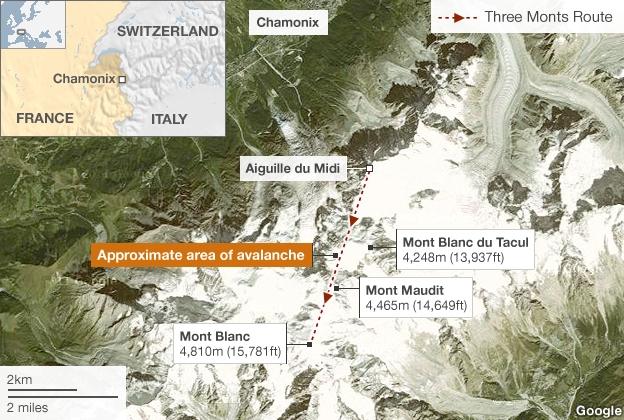Alps avalanche: Tributes for British climber Roger Payne
- Published
The BBC's Imogen Foulkes: 'The focus after this tragedy is to find out exactly how this happened'
Tributes have been paid to three Britons, including one of the UK's most respected climbers, who were killed in an avalanche near a French ski resort.
The British Mountaineering Council said climbers were "shocked and saddened" to hear that its former general secretary, Roger Payne, was among those who died near the Alpine resort of Chamonix.
Foreign Secretary William Hague called their deaths a "terrible tragedy".
Nine died, with the others reported to be from Spain, Germany and Switzerland.
The three Britons' next of kin have been informed.
They were part of a 28-person group attempting to reach the summit of Mont Blanc by traversing the slopes of Mont Maudit, where the avalanche struck.
Mr Payne, originally from Hammersmith in west London, was working as a guide.
The current chief executive of the British Mountaineering Council (BMC), Dave Turnbull, said the mountaineering world was "shocked and saddened" to learn of his death.
"Roger was one of the UK's most enthusiastic and respected climbers with a track record of Alpine and Himalayan mountaineering stretching back to the 1980s," he said.
"Our thoughts are with Roger's friends and family - in particular his wife, Julie-Ann."
<link> <caption>In an obituary on the BMC site,</caption> <url href="http://www.thebmc.co.uk/roger-payne-killed-on-mont-maudit-ed-douglas-looks-back-on-his-life" platform="highweb"/> </link> Ed Douglas said there were few areas of the mountaineering world Mr Payne had not influenced for the better.
"The overriding impression he leaves is of an unwavering and infectious enthusiasm for the mountain life," he said.
Alan Hinkes, a fellow climber who had known Mr Payne for 35 years, said he had "put more into mountaineering than he had taken out".
"You do not expect this to happen to someone like Roger, he was one of the safest climbers I knew," he told BBC Radio 4's Today programme.
Mr Hinkes said the climbing party had set off pre-dawn with head torches, before temperatures rose and made conditions less safe.
He added: "You do push [the risks] to the back of your mind ... we do not climb to die, we climb to live. It does enhance our lives.
"Roger was doing what he wanted to do ... he was helping two people to get to the top ... he's a larger-than-life character who will be sorely missed.
"It does not put you off, and people wonder why it doesn't ... it is a bit like if you see a road traffic accident, you do not give up driving.
"We are just climbers. We cannot help ourselves, I guess."
Avalanche 'blackspot'
British mountaineer Kenton Cool said Mr Payne's death would send shockwaves through the mountain guide community.
He added that the area was known as something of an avalanche "blackspot".
"Every few years there is a big avalanche ... it would be a huge wave of snow," he said.
The French authorities described the avalanche as "the most deadly" in recent years.

Police said there was no-one still missing after the avalanche.
Four climbers who were reported missing have been accounted for. Police said two cancelled their climb and the other two had chosen a different route.
Dave Compton, a British climber who was feared missing in the immediate aftermath of the avalanche, said he and his climbing partner had turned back to Chamonix after seeing the treacherous conditions.
'Very saddened'
Foreign Secretary William Hague said he was "very saddened" by the incident and sent his deepest condolences to the friends and families of those affected.
"We will offer whatever support and assistance we can. I would also like to thank the French rescue services for their efforts in these difficult circumstances," he said.
Officials said 28 people had set off from a climbing hut to attempt the route on Thursday.
Some had been supervised by professional mountaineering guides but others had been climbing independently.
Friend of Roger Payne, Alan Hinkes: 'We don't climb to die'
They are believed to have reached 4,000m (13,120ft) when the avalanche struck.
The alarm was sounded at 05:25 local time (04:25 BST) by an injured climber on the route, which is popular with tourists trekking towards nearby Mont Blanc.
Nine people were airlifted to hospital in Sallanches with minor injuries.
Mont Maudit - meaning the cursed mountain - is the third-highest peak in the Mont Blanc massif range, rising to 4,465m.
The last major avalanche in the Alps was in 2008, when eight Swiss, German and Austrian climbers perished.
- Published12 July 2012
- Published12 July 2012